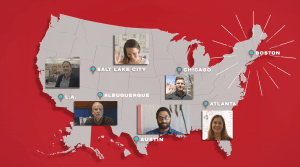Q: What’s it all about?

Dr. Ed Powers
A: It’s the next level in experiential learning for our students. Our virtual firm looks and feels just like a small public relations agency. Through it we are integrating our public relations coursework with six-month projects covering six months for real-life clients. And the students will perform the client work using a leading marketing software tool. The purpose is to have students ready for PR jobs that are in demand in the marketplace.
Q: What’s new and different about the Virtual Public Relations Firm?
 A: The student experience will be one of a kind. They will play the role of employees in the firm, working directly with the client to develop a public relations campaign. Their instructors will be their coaches, drawing from years of professional experience. They will learn how to use HubSpot, a marketing platform widely in use across many industries. We know of no other university that is doing this.
A: The student experience will be one of a kind. They will play the role of employees in the firm, working directly with the client to develop a public relations campaign. Their instructors will be their coaches, drawing from years of professional experience. They will learn how to use HubSpot, a marketing platform widely in use across many industries. We know of no other university that is doing this.
Q: How does the Virtual Public Relations Firm work? What are the details?
A: By enrolling in the core public relations courses, students automatically join the virtual firm. At the end of each course, the students present their work to the client, which then becomes the starting point for the next course. For example, the PR research report the students create this fall will form the basis for beginning work on the PR strategic plan in the winter. The courses start with Public Relations Research, which moves to Public Relations Strategy, which then leads to Public Relations Content and Advanced Public Relations Content.
Q: Who are the clients? Who will the students be performing their public relations work for?
A: Our first two clients are based on opposite coasts and have Northeastern connections. Neuron is a UX design firm based in San Francisco founded by two Northeastern graduates. The Biopharmaceutical Analysis Training Laboratory is a Northeastern center providing regulatory-related training to organizations globally to improve patient access to safe healthcare products.
Q: In addition to creating and executing an actual public relations campaign, can you describe how the Virtual Public Relations Firm provides students with real-world experience?
A: Students have been able to take courses online for some time, but now  they will perform their work for a client remotely as well. This matches the increasingly virtual nature of today’s workplace. Also, the students are the face of the virtual firm to the client. That opportunity to build a relationship with a client is invaluable. In addition, unlike a traditional class, where the desired outcomes are well known from the start, the students must figure out what the client needs and then create it. That ability to deal with unknowns and ambiguity is exactly how real-world projects unfold.
they will perform their work for a client remotely as well. This matches the increasingly virtual nature of today’s workplace. Also, the students are the face of the virtual firm to the client. That opportunity to build a relationship with a client is invaluable. In addition, unlike a traditional class, where the desired outcomes are well known from the start, the students must figure out what the client needs and then create it. That ability to deal with unknowns and ambiguity is exactly how real-world projects unfold.
Q: How else do you think the Virtual Public Relations Firm will benefit the students?
A: The biggest benefit is that students will have a concrete answer to the job interview question, “What experience do you have?” In the process, they will gain confidence in their abilities to perform public relations work that employers need. This includes both core public relations skills, such as preparing content and managing digital media, and soft skills essential for project success, such as collaborating with teammates and preparing persuasive presentations.
In this video, Ed Powers talks more in-depth about how this virtual experience will help students be more competitive in today’s job market.
Posted by Ed Powers, Faculty